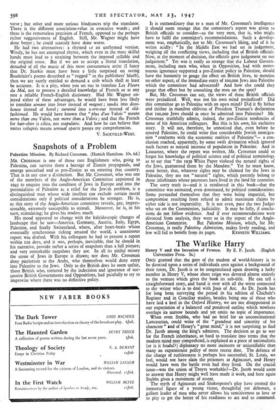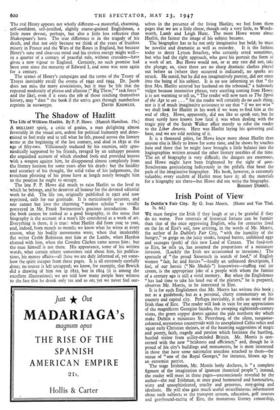The Warlike Harry
ONCE granted that the gaze of the student of world-history is to be directed upon a series of individuals seen against a background of their times, Dr. Jacob is to be congratulated upon drawing a lucky number in Henry V, whose short reign was devoted almost entirely to the venture which gives the book its sub-title. He can tell a straightforward story, and hand it over with all the wires connected to the writer who is to deal with Joan of Arc. As Dr. Jacob has for long been surveying the period in his edition of Chichele's Register and in Conciliar studies, besides being one of those who have laid a keel in the Oxford History, we are not disappointed in our expectation of a balanced and pondered outline which nowhere overlaps its narrow bounds and yet omits no topic of importance.
When even Stubbs, who had no brief for an unconstitutional Lancastrian, could write of the " grandeur and sincerity of his character " and of Henry's " great mind," it is not surprising to find Dr. Jacob among the king's admirers. The decision to go to war for the French inheritance, so hard to translate into terms that the modem mind may comprehend, is explained as a piece of nationalistic (or is it feudal?) diplomacy no more insincere or 'unjustifiable than many an expansionist policy of more recent date. The defence of the charge of ruthlessness is perhaps less successful; St. Louis, we feel, would not have slain the prisoners at Agincourt, and Henry would have won the battle even had they lived. On the crucial issue—was the union of Troyes workable?—Dr. Jacob would seem to answer that Henry might well have made it work, and here again Stubbs gives a movement of assent.
The myth of Agincourt and Shakespeare's play have created the immortal figure of a young victor, thoughtful yet debonair, a gallant leader of men who never allows his sensitiveness to love or to pity to get the better of his readiness to act and to command The real Henry appears not wholly different—a masterful, charming, self-confident, self-justified, slightly coarse-pained Englishman, a little more devout, perhaps, but also a little less reflective than Shakespeare's hero. The true difference is in the tragedy of his death, and that not only because we think of the years of fruitless misery in France and the Wars of the Roses in England, but because Henry's sane and clear-cut mind and his tireless energy might well— in a quarter of a century of peaceful rule, without crusades—have given a new vigour to England. Certainly, no such promise had been seen since the maturity of Edward I, and none was seen again for a century.
The scenes of Henry's campaigns and the terms of the Treaty of Troyes inevitably recall ate events of 1940 and 1944. Dr. Jacob does not miss the many associations, but it may be felt that the repeated modernity of phrase and allusion (" Big Three," " task force " and the like), even if it eases the job of those teaching themselves history, may " date " the book if the series goes through numberless



































 Previous page
Previous page